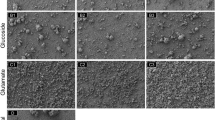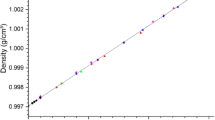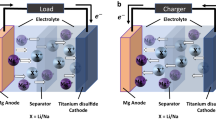Abstract
ON conversion of the sodium salt of alginic acid (poly-d-manuronic acid) into the magnesium salt, a marked alteration of molecular weight and viscosity properties takes place, as shown by the figures in Table 1. The molecular weights were determined by light scattering and refractivity measurements (λ = 536 and 446 mµ, angular scattering dependence, in some tests, between 135 and 25°, 19 angles), and the viscosities were measured in Flory and Couette viscometers, the rate of shear being varied from 0.4 to 2,500 sec.−1. In most experiments the solvent was an unbuffered aqueous solution of, respectively, 0.100 M sodium chloride and 0.0200 M magnesium chloride, pH about 5, but some of the viscosity tests were also made in solutions of different ionic strength and in the presence of sodium or magnesium veronal buffers, pH = 7.43.
This is a preview of subscription content, access via your institution
Access options
Subscribe to this journal
Receive 51 print issues and online access
$199.00 per year
only $3.90 per issue
Buy this article
- Purchase on SpringerLink
- Instant access to full article PDF
Prices may be subject to local taxes which are calculated during checkout
Similar content being viewed by others
Author information
Authors and Affiliations
Rights and permissions
About this article
Cite this article
COOPER, R., WASSERMANN, A. Influence of Ion Exchange on Size and Shape of Chain-like Polyelectrolyte Molecules. Nature 180, 1072 (1957). https://doi.org/10.1038/1801072a0
Issue date:
DOI: https://doi.org/10.1038/1801072a0



